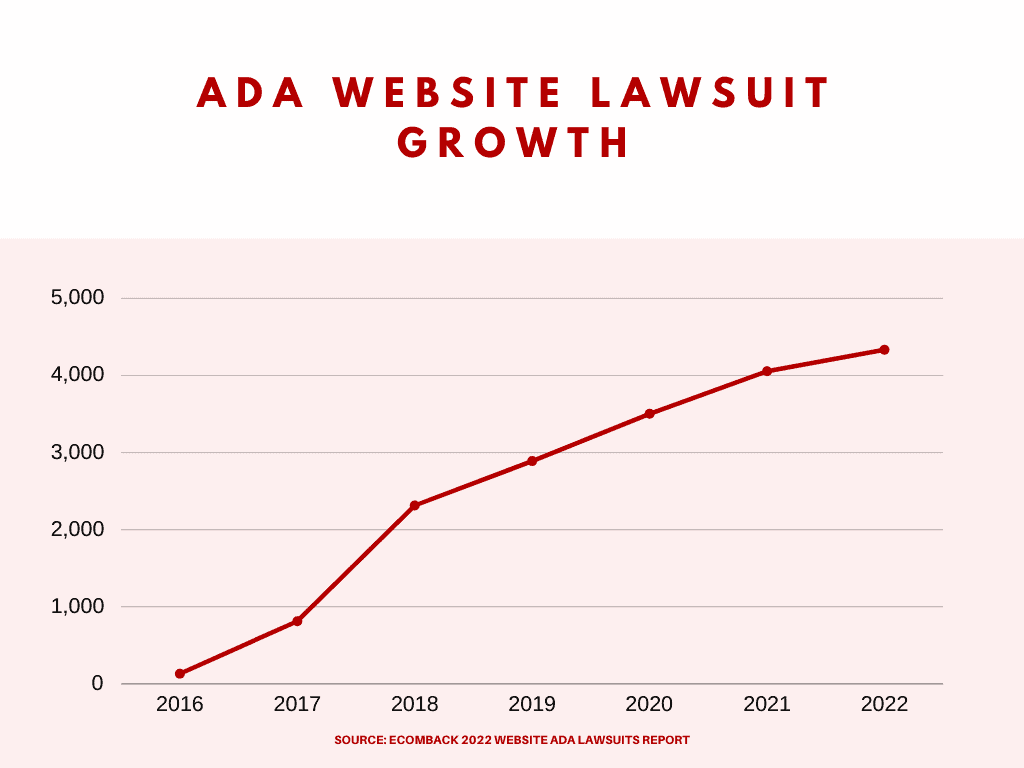Helping Clients Navigate ADA Website Compliance
& The “Murky Underworld” of ADA Website Accessibility Lawsuits
Few things are more intimidating to a business owner, especially a small business with relatively limited resources, than being served with a lawsuit claiming their website is not compliantly accessible and therefore violates the Americans with Disabilities Act (ADA) or similar state laws (most commonly the Unruh Civil Rights Act in California and similar accessibility law in New York). There are also international accessibility-focused laws, such as the European Accessibility Act of 2025. While the passage of the ADA in 1990 was aimed at ensuring that those with disabilities can be equal members of society, the way the law was drafted has resulted in unintended consequences where businesses not meant to be within the scope of the law, mainly stand-alone e-commerce websites, are subjected to “a contagion of lawsuits.” After being served with an ADA lawsuit, business owners learn that there is a seemingly murky underworld of lawyers and “serial plaintiffs” who have taken advantage of a law that had good intentions aimed at helping the significant numbers of disabled people and instead created a thriving “cottage industry” at the expense of small business owners who are often struggling to keep their businesses afloat.
ADA Lawsuits Alleging Website Non-Compliance Are Proliferating
Unfortunately, the number of ADA lawsuits alleging website non-compliance due to lack of accessibility is increasing exponentially. According to a recent report, while there were only 117 lawsuits filed in 2017 based on ADA website accessibility issues, in 2023, 4,334 such lawsuits were filed, with only a minor decrease from 2022. Further, ADA Title III lawsuits, including those not in the website context, numbered over 8,000 – with California and New York leading. According to a recap of 2024 ADA Title III claims, “four law firms each filed more than 100 federal ADA Title III lawsuits last year” (So. Cal Equal Access Group, based out of Los Angeles, filed 2,598; Stein Saks, based out of New York, filed 395 lawsuits; Sconzo Law, based out of Florida, filed 193 lawsuits; and Gottlieb Associates, based out of New York, filed 190 lawsuits). It is no wonder that more and more business owners find themselves panicking as they learn they are the defendants in an opaque lawsuit. After all, there are no clear rules as to what constitutes an accessible website, in particular, since the World Wide Web Consortium and the Web Content Accessibility Guidelines (WCAG) are not legal standards per se.
While the Department of Justice has put out guidance on various aspects of the ADA in the context of website compliance, there is much to be desired, including questions about how different versions of a website aimed at ensuring accessibility are deemed “segregation.” Sure, there are a variety of best practices, but many of these are arbitrary. As a matter of fact, even the DOJ is not compliant with the accessibility standards they refer to and provide ongoing guidance about. Still, some of the most common allegations concerning lack of website accessibility revolve around lack of alternative text for images, lack of captions, poor color contrast, lack of labels for forms, and lack of captcha alternatives, among other design components.
There are services that claim to make a website or other digital property accessible and, therefore, protect against lawsuits, but there is much nuance here, too. For example, one of the largest “automated” accessibility compliance tools, accessiBe, was subject to much criticism and, subsequently, enforcement action by the Federal Trade Commission (FTC). Specifically, the FTC alleged (among other allegations) that accessiBe “misrepresented the ability of its AI-powered web accessibility tool to make any website compliant with the Web Content Accessibility Guidelines (WCAG) for people with disabilities.” While companies offering remediation services have a role to play, they are not the silver bullet, and due diligence must be front and center when evaluating their offerings as part of an ADA compliance and risk mitigation strategy for your website.
As if the regulatory clarity vacuum is not enough, some ADA “serial plaintiffs” withdraw their lawsuits at the last minute so as not to get an unfavorable outcome that will put the “shakedown” of businesses based on the ADA to an end. This exact consideration is likely at play in a similar area of “ADA tester” cases that the Supreme Court considered. While there are reasons to be hopeful, including judges who dismiss “manufactured” and “boilerplate” complaints from serial website plaintiffs for various reasons, including vagueness (as well as related judicial rebukes) and a ruling out of the Southern District of New York that the ADA does not apply to web-only business, the problem persists, including because other courts, such as in Minnesota, have ruled differently. Even where factually meritless ADA claims are made, and angry defendants pursue surly plaintiff’s counsel for attorney fees, the battle is uphill and, even in clear cases, may not succeed.
The surly nature of “drive-by,” sometimes referred to as “surf-by,” ADA website lawsuits, and the characters behind them are immensely frustrating and also damaging, but ignoring any lawsuit, regardless of the merits, is untenable as doing so can have devastating consequences, including by way of a default judgment. With that in mind, a common challenge that those on the receiving end of ADA accessibility lawsuits face is who to turn to to navigate and potentially fight the suit to success. They may be bombarded with solicitations by lawyers who reach out upon seeing a particular business is sued, claiming they can help. It is hard for a company to know who to trust because some lawyers purporting to defend business owners may be “chummy” with the serial plaintiff lawyers or act as a plaintiff’s counsel in other cases, leading to potentially more unfavorable outcomes.
An ADA Website Lawyer Who Understands The “Murky” Landscape
At RICHT, we are an ADA website compliance lawyer passionate about acting as a steady hand to help clients astutely navigate the confusing landscape of complaints by “opportunistic and vexatious ADA litigants” who allege the inaccessibility of a website. While we hope that in response to the growing calls for reform, the courts or lawmakers provide reprieve to businesses by providing much-needed clarity as to the application scope and compliance parameters of the ADA, until then, we will serve clients as trustworthy counsel in defending their businesses from ADA lawsuits. From general ADA website compliance aimed at minimizing the chances of an ADA lawsuit to insurance coverage analysis and ADA litigation strategy and defense to emerging areas such as how the ADA and accessibility interact with AI, we offer a full suite of services to help clients protect their businesses from ADA website compliance risk.

ADA Website Compliance & Lawsuit Defense Services We Offer
ADA WebAccessibility Compliance
ADA Litigation Strategy & Defense
ADA Insurance Coverage Review









